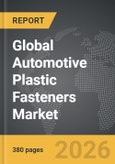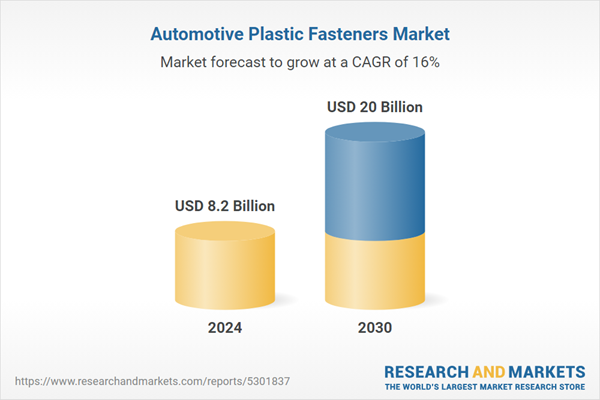Global Automotive Plastic Fasteners Market - Key Trends and Drivers Summarized
Why Are Plastic Fasteners Gaining Popularity in the Automotive Industry?
Automotive plastic fasteners have gained considerable traction in recent years, but what sets them apart from traditional metal fasteners? Their primary appeal lies in their lightweight composition, a key advantage as automakers strive to reduce vehicle weight to improve fuel efficiency and decrease emissions. Plastic fasteners contribute to this effort by reducing the overall mass of non-structural vehicle components, which can result in meaningful fuel savings over a vehicle's lifetime. With stricter emissions regulations on the horizon and growing environmental awareness, the automotive industry is increasingly focused on solutions like plastic fasteners to achieve eco-friendly, high-efficiency designs. Beyond their weight benefits, plastic fasteners offer excellent resistance to corrosion, making them highly durable in environments exposed to moisture, chemicals, or other corrosive agents. Unlike metal fasteners, which are prone to rust and degradation over time, plastic fasteners maintain their structural integrity, which prolongs the lifespan of vehicle components and reduces the need for frequent replacements. They also provide reliable electrical insulation, a critical feature for preventing short circuits in electrical assemblies. Additionally, plastic fasteners are cost-effective to produce and easy to install, lowering manufacturing costs while enhancing overall assembly efficiency. Combined, these factors make plastic fasteners a compelling choice for automotive manufacturers looking to improve performance and sustainability.What Are the Key Types and Applications of Plastic Fasteners in Vehicles?
Plastic fasteners are available in a variety of types and designs, each tailored to specific applications within a vehicle, and they play essential roles in both functional and aesthetic aspects of automotive manufacturing. Common types of plastic fasteners include clips, cable ties, grommets, rivets, and push-in fasteners, each designed for particular uses in securing vehicle components. Clips and push-in fasteners, for example, are extensively used to attach interior panels, door trims, and dashboard elements, providing a secure, clean, and easily detachable solution that allows for quick assembly and removal when needed. Cable ties are vital for bundling and managing wiring assemblies, keeping them organized and preventing interference with other components. In areas exposed to greater physical stress, such as the engine compartment or the exterior, grommets and rivets provide durability and resistance to vibration, while protecting components from the harsh conditions under the hood. Plastic fasteners used in these demanding areas are specially designed to meet automotive standards for heat resistance, durability, and chemical stability, enabling them to withstand high-stress conditions. By offering versatile solutions for a range of needs, plastic fasteners have become indispensable in automotive manufacturing, supporting the assembly and stability of both structural and non-structural components throughout the vehicle.How Are Technological Advancements Enhancing the Performance of Plastic Fasteners?
The capabilities of automotive plastic fasteners have advanced significantly due to innovations in technology, which have expanded their applications and improved their performance. One notable advancement lies in polymer engineering, where the development of high-performance thermoplastics and composite materials has made plastic fasteners more resilient under high temperatures and stress, meeting the demands of applications like engine bays and exhaust systems. This material evolution allows plastic fasteners to withstand conditions that were once thought suitable only for metal, broadening their potential uses in the automotive sector. In addition, the advent of 3D printing technology has revolutionized fastener design and manufacturing, enabling rapid prototyping and custom fabrication of fasteners tailored to specific automotive needs. This customization provides automakers with the flexibility to produce fasteners that precisely meet performance requirements without the time and expense associated with traditional injection molding processes. Furthermore, digital tools and simulation software now allow engineers to test fastener designs in virtual environments, optimizing shapes and structures for improved strength, aerodynamics, and distribution of weight. As automotive designs evolve to become more complex and environmentally conscious, these advancements in plastic fastener technology provide manufacturers with efficient, versatile, and durable options that meet modern production and sustainability standards.What Factors Are Driving the Growth of the Automotive Plastic Fastener Market?
The growth in the automotive plastic fastener market is driven by several interrelated factors that reflect shifts in vehicle design, advancements in material science, and evolving consumer preferences. A key driver is the industry-wide push toward vehicle weight reduction, as automakers work to meet stricter fuel efficiency and emissions standards. Plastic fasteners, which are significantly lighter than their metal counterparts, play an essential role in these weight-saving efforts, especially as the demand for electric vehicles (EVs) grows and manufacturers seek to balance the weight added by batteries and other high-tech components. Another major factor is the cost-effectiveness of plastic fasteners. They are typically cheaper to produce than metal fasteners and easier to install, which translates into lower manufacturing costs and faster assembly times for automakers. Furthermore, plastic fasteners offer enhanced resistance to corrosion, moisture, and chemicals, ensuring greater durability for automotive components and aligning with the industry's push for low-maintenance, long-lasting vehicle designs. Technological advancements such as high-performance thermoplastics and 3D printing have further expanded the utility of plastic fasteners, enabling their use in more demanding environments, including under-the-hood and exterior applications. Finally, the growing focus on sustainability in the automotive industry has driven interest in eco-friendly plastic fasteners, many of which are now made from recyclable or bio-based materials to meet regulatory and consumer demands for greener products. Together, these factors underscore a strong growth trajectory for the automotive plastic fastener market, supported by the industry's evolving standards, technological innovations, and a shift toward more sustainable and efficient manufacturing solutions.Report Scope
The report analyzes the Automotive Plastic Fasteners market, presented in terms of market value (US$ Thousand). The analysis covers the key segments and geographic regions outlined below.- Segments: Function (Bonding, NVH); Application (Wire Harnessing, Interior, Electronics, Exterior, Powertrain, Chassis, Other Applications); End-Use (Passenger Cars, Light Commercial Vehicles).
- Geographic Regions/Countries:World; United States; Canada; Japan; China; Europe (France; Germany; Italy; United Kingdom; Spain; Russia; and Rest of Europe); Asia-Pacific (Australia; India; South Korea; and Rest of Asia-Pacific); Latin America (Argentina; Brazil; Mexico; and Rest of Latin America); Middle East (Iran; Israel; Saudi Arabia; United Arab Emirates; and Rest of Middle East); and Africa.
Key Insights:
- Market Growth: Understand the significant growth trajectory of the Bonding Function segment, which is expected to reach US$15.4 Billion by 2030 with a CAGR of a 15.4%. The NVH Function segment is also set to grow at 18.2% CAGR over the analysis period.
Why You Should Buy This Report:
- Detailed Market Analysis: Access a thorough analysis of the Global Automotive Plastic Fasteners Market, covering all major geographic regions and market segments.
- Competitive Insights: Get an overview of the competitive landscape, including the market presence of major players across different geographies.
- Future Trends and Drivers: Understand the key trends and drivers shaping the future of the Global Automotive Plastic Fasteners Market.
- Actionable Insights: Benefit from actionable insights that can help you identify new revenue opportunities and make strategic business decisions.
Key Questions Answered:
- How is the Global Automotive Plastic Fasteners Market expected to evolve by 2030?
- What are the main drivers and restraints affecting the market?
- Which market segments will grow the most over the forecast period?
- How will market shares for different regions and segments change by 2030?
- Who are the leading players in the market, and what are their prospects?
Report Features:
- Comprehensive Market Data: Independent analysis of annual sales and market forecasts in US$ Million from 2024 to 2030.
- In-Depth Regional Analysis: Detailed insights into key markets, including the U.S., China, Japan, Canada, Europe, Asia-Pacific, Latin America, Middle East, and Africa.
- Company Profiles: Coverage of players such as Araymond, ATF, Avery Dennison Corporation, Bossard Group, Illinois Tool Works and more.
- Complimentary Updates: Receive free report updates for one year to keep you informed of the latest market developments.
Some of the 41 companies featured in this Automotive Plastic Fasteners market report include:
- Araymond
- ATF
- Avery Dennison Corporation
- Bossard Group
- Illinois Tool Works
- MW Industries
- Nippon Industrial Fasteners Company (Nifco)
- Shanghai Fasteners Company
- SNF Group Penn Engineering
- Stanley Black & Deckera
This edition integrates the latest global trade and economic shifts into comprehensive market analysis. Key updates include:
- Tariff and Trade Impact: Insights into global tariff negotiations across 180+ countries, with analysis of supply chain turbulence, sourcing disruptions, and geographic realignment. Special focus on 2025 as a pivotal year for trade tensions, including updated perspectives on the Trump-era tariffs.
- Adjusted Forecasts and Analytics: Revised global and regional market forecasts through 2030, incorporating tariff effects, economic uncertainty, and structural changes in globalization. Includes historical analysis from 2015 to 2023.
- Strategic Market Dynamics: Evaluation of revised market prospects, regional outlooks, and key economic indicators such as population and urbanization trends.
- Innovation & Technology Trends: Latest developments in product and process innovation, emerging technologies, and key industry drivers shaping the competitive landscape.
- Competitive Intelligence: Updated global market share estimates for 2025, competitive positioning of major players (Strong/Active/Niche/Trivial), and refined focus on leading global brands and core players.
- Expert Insight & Commentary: Strategic analysis from economists, trade experts, and domain specialists to contextualize market shifts and identify emerging opportunities.
Table of Contents
Companies Mentioned (Partial List)
A selection of companies mentioned in this report includes, but is not limited to:
- Araymond
- ATF
- Avery Dennison Corporation
- Bossard Group
- Illinois Tool Works
- MW Industries
- Nippon Industrial Fasteners Company (Nifco)
- Shanghai Fasteners Company
- SNF Group Penn Engineering
- Stanley Black & Deckera
Table Information
| Report Attribute | Details |
|---|---|
| No. of Pages | 380 |
| Published | January 2026 |
| Forecast Period | 2024 - 2030 |
| Estimated Market Value ( USD | $ 8.2 Billion |
| Forecasted Market Value ( USD | $ 20 Billion |
| Compound Annual Growth Rate | 16.0% |
| Regions Covered | Global |









